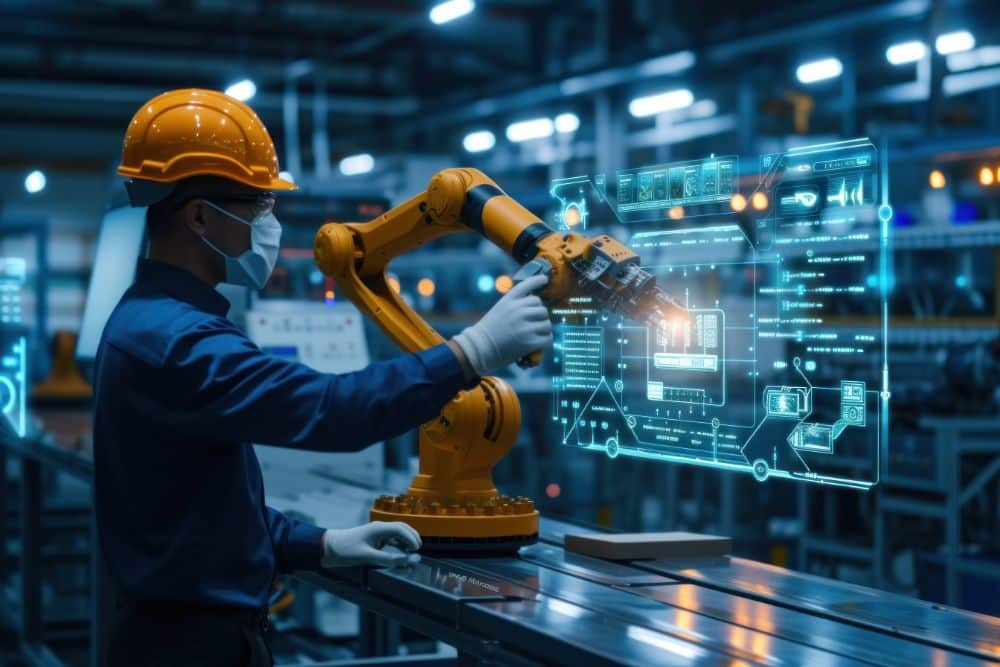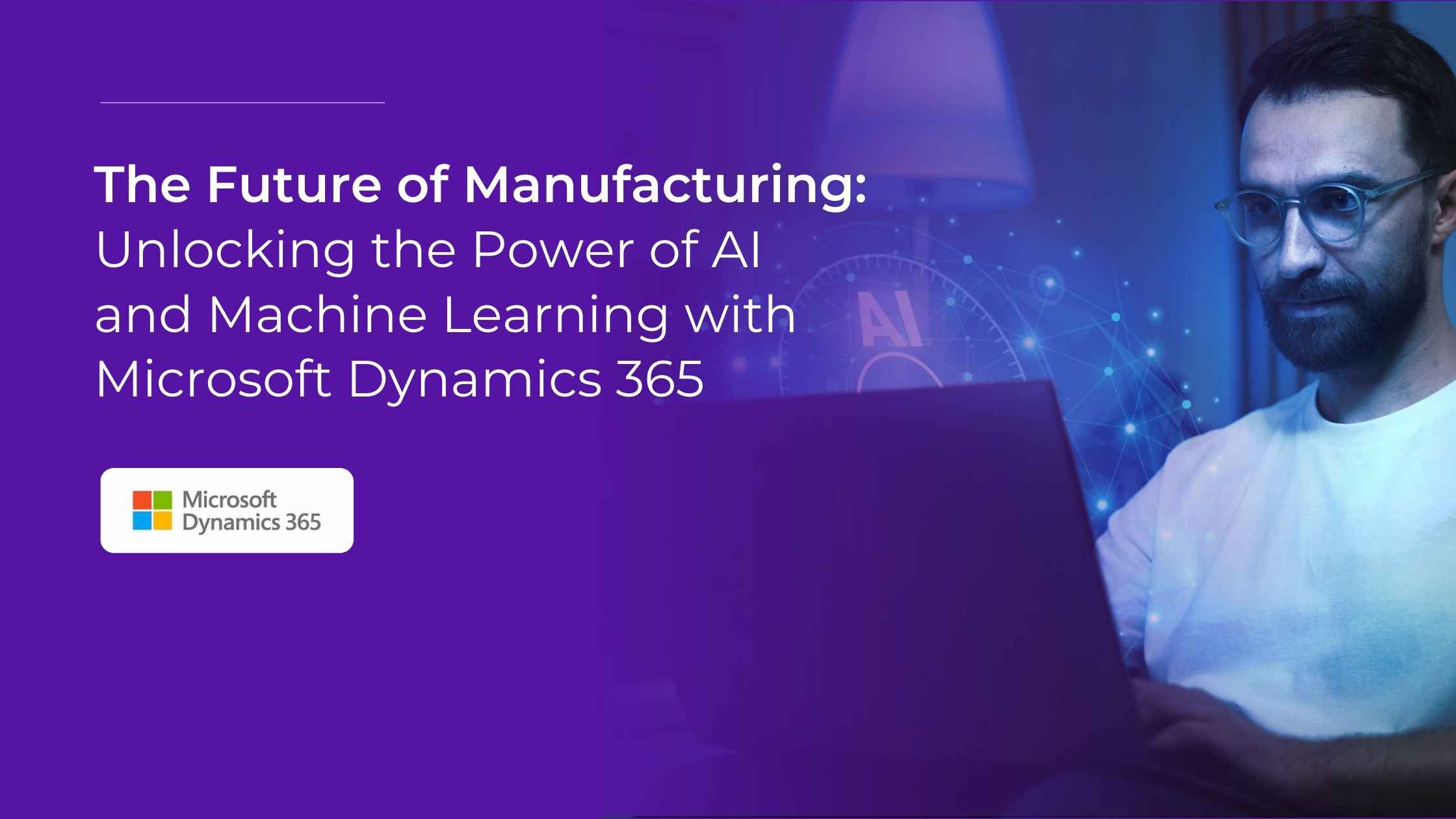The manufacturing industry is entering a new era, one defined by intelligent systems, datadriven operations, and relentless innovation. The integration of Artificial Intelligence (AI) and
Machine Learning (ML) into manufacturing processes is no longer a vision of the distant future –
it’s happening now, and businesses that fail to adopt these technologies risk being left behind.
Chapter 2 of our latest whitepaper, “The Future of Manufacturing: How Microsoft Dynamics 365
Transforms Smart Factories” focuses on the transformative role AI and Machine Learning play in
modern manufacturing. If you’re in a leadership role this chapter is essential reading for you. It
delves deep into how AI is revolutionising manufacturing, enhancing efficiency, and driving
innovation, with real-world insights on the integration of Microsoft Dynamics 365 (D365).
The future of manufacturing is increasingly dependent on AI and ML, and the barriers to entry for
these technologies are rapidly diminishing. According to Gartner, 64% of manufacturers expect
AI to significantly improve supply chain efficiency within the next five years. AI’s applications in
predictive maintenance and quality control are reshaping the industry landscape.
In fact, predictive maintenance alone can reduce machine downtime by 30-50% and increase
machine life by 20-40%. This makes it one of the most significant AI applications in
manufacturing today
Microsoft Dynamics 365: Driving the AI Revolution in Manufacturing
Microsoft Dynamics 365 is at the forefront of these advancements, enabling manufacturers to
harness AI-driven insights and ML algorithms to enhance operational efficiency and
performance. With D365, manufacturers can monitor equipment in real-time, perform
predictive maintenance, and optimise production processes.
Other solutions – like Copilot, SiteCore, Snowflake Document AI, and Databricks – are notable
players in the market, offering powerful data platforms. However, Microsoft D365 offers a
comprehensive and integrated solution tailored specifically for manufacturing, providing
businesses with the tools to make smarter decisions, improve quality control, and boost
operational efficiency.
AI-Powered Demand Forecasting: Optimising Inventory and Reducing Waste
Demand forecasting is one area where AI is driving remarkable results. Microsoft D365 allows
businesses to leverage historical data, real-time market trends, and AI-powered analytics to
refine demand forecasting models. This capability enables manufacturers to reduce
overproduction, mitigate stockouts, and optimise inventory management.
According to McKinsey, businesses that incorporate AI into demand forecasting processes see
an improvement in accuracy of 20-50%. For manufacturers, these improvements translate
directly into cost savings, more efficient supply chain management, and reduced environmental
impact due to less waste

Enhanced Quality Control and Cost Reduction through AI
Ensuring consistent product quality while keeping costs under control is a key challenge for
manufacturers. Here again, AI and Machine Learning play pivotal roles. Microsoft Dynamics 365
automates AI-driven quality control processes, identifying defects and anomalies in real-time,
and ensuring higher product quality with less waste.
By integrating AI to analyse production data, D365 helps manufacturers optimise production
lines, reducing inefficiencies and lowering production costs. According to a Boston Consulting
Group (BCG) analysis, AI can reduce production conversion costs by up to 20%, with as much
as 70% of that cost reduction coming from improved workforce efficiency.
Smart Automation: Streamlining Operations and Reducing Errors
The smart automation of repetitive tasks is another significant benefit of AI integration in
manufacturing. McKinsey estimates that up to 45% of work activities in the industry could be
automated through AI and Robotic Process Automation (RPA). This is a game-changer for
reducing human error in tasks like order processing and inventory management, which are often
prone to mistakes.
By integrating AI with RPA, Microsoft Dynamics 365 allows manufacturers to automate repetitive
tasks, reducing errors and freeing employees to focus on higher-value, strategic activities. The
result? Streamlined operations, reduced overhead costs, and improved employee productivity.
Driving Sustainability with AI and Machine Learning
Sustainability and energy efficiency are critical concerns for today’s manufacturers. AI-powered
solutions like Microsoft Dynamics 365 offer powerful tools for improving energy efficiency,
optimising resource use, and reducing waste.
D365 uses AI-driven analytics to monitor and optimise energy usage across manufacturing
facilities. By adjusting ML algorithms to optimise operations, manufacturers can significantly
reduce energy waste. AI also plays a key role in waste management, identifying and sorting
waste with near-perfect accuracy.
Why You Should Download the Whitepaper
The future of manufacturing is clear: it’s smart, data-driven, and powered by AI. Microsoft
Dynamics 365 is leading this transformation, offering manufacturers the tools they need to
succeed in a rapidly changing world. From predictive maintenance to demand forecasting, from
smart automation to enhanced quality control, D365 offers a comprehensive solution to the
challenges and opportunities manufacturers face today.
This is a must-read for executives and decision-makers looking to stay ahead of the curve in an
increasingly competitive industry.
Key Takeaways:
- Predictive maintenance can reduce downtime by 30-50% and increase machine life by
20-40% - AI-driven demand forecasting improves accuracy by 20-50%, reducing overproduction
and stockouts - AI can reduce production costs by up to 20%, with 70% of the savings coming from
improved workforce efficiency - Automating up to 45% of repetitive tasks with AI and RPA reduces human error and
boosts productivity - AI can cut energy waste and optimise waste management, reducing transport distances
by up to 36.8%.
manufacturing.
